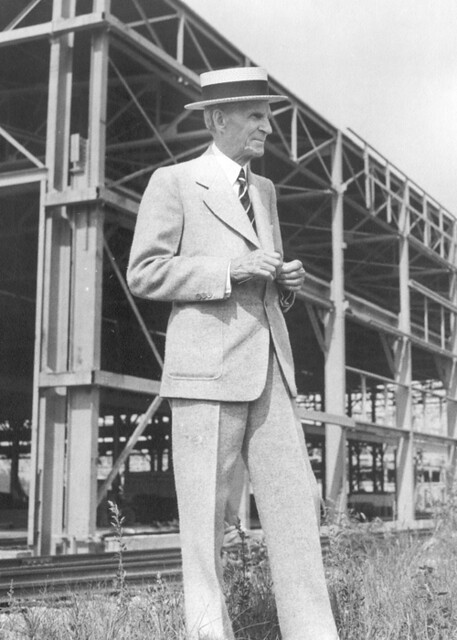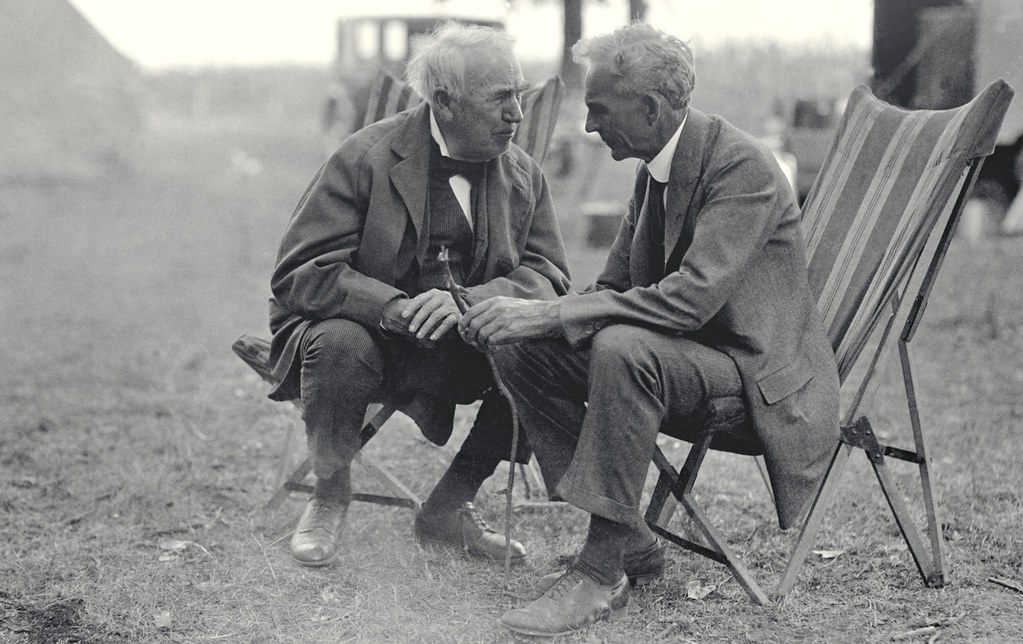 |
| Henry Ford Unknown author / (CC BY-NC-SA 2.0) via Flickr |
Henry Ford was a well known businessman and a leader in industry. Born on July 30, 1863 in Dearborn, Michigan, to a pair of farmers, Ford was quite unlike his parents. While growing up he was constantly fiddling with machines. While he was a young man, he married a lovely woman named Clara Bryant. During his career as an automobile manufacturer, he was quite successful and became one of the richest and most influential men in the world. In the 1940’s he retired and gave his company to his grandson Henry Ford II. On April 7, 1947 Ford died of a cerebral hemorrhage at his home in Dearborn, Michigan. Ford was known as a thoughtful, determined, and quite intelligent person. While some people only see Henry Ford as a rich businessman, his creative mind, perseverance and caring heart make him a true hero.
Ford prospered in his life through his own unique and eccentric ideas. As a young man he was interested in improving land-based transportation. He built his own steam engine and combined it with a mowing machine to make a tractor ("Ford, Henry (1863-1947)"). This invention gave him help on his family’s farm, and practice on his passion for machines. Manipulating complex machinery at a young age shows great skill and resourcefulness in a time deprived of modern conveniences. As Ford developed his career, his ideas became much more groundbreaking. In 1913 Ford created a method of improving mass production called the assembly line ("Henry Ford"). It was brilliant in that, instead of every worker building one car at a time, parts of a car were made and transported down to other workers along a conveyor belt. Ford’s strategy of thinking in a broader view led him to see key opportunities that others were oblivious to. Where other people saw only failure and inadequacy, Ford saw opportunity and always took full advantage of it.
 |
| Thomas Edison and Henry Ford Ford Motor Company/ (CC BY-NC-SA 2.0) via Flickr |
Ford had a natural tenacious attitude toward his goal of being himself and making the world a better place. Many conflicts arose in Ford’s life that threatened to end his career. When the government denied him a license to make engines, he fought for over eight years and finally achieved it ("Henry Ford"). This persistent obstacle demonstrated his conviction to machinery. Instead of rolling over he risked imprisonment in order to get something that he needed. Despite past victories, Ford was almost taken off guard when the nation experienced its most severe, upcoming crisis. During the Great Depression, Ford’s company endured great struggles but came out still within the top three most powerful car companies in the world ("Ford, Henry (1863-1947)"). This crisis gave Ford a battle of inner-strength, which he won using optimism and persistence. In this dark time, he refused to give into despair and kept going day after day. As tragedy struck, Henry Ford still kept his head up high and continued moving forward.
Through his successful career he made time to help those who were less fortunate. Ford recognized that some of his customers were poor and struggling to afford his cars. He made his cars low-priced so that lower class families could afford them ("Ford, Henry (1863-1947)."). This gesture was bold and generous since many people considered cars were only for the rich. He cared more about the public’s need more than his own. Ford’s benevolence didn’t only include his fellow citizens, but also extended to people around the world. In World War 1 Ford assembled a group of 170 people to travel to Europe to establish peace ("Henry Ford."). His attempt to personally end one of the most gruesome conflicts of all time, shows that his compassion was nearly unlimited. Even though his cause didn’t succeed, he was still willing to risk his life to save a stranger’s. Ford’s empathy and profound sense of honor established him as a courageous yet gentle human being.
 |
| Younger Henry Ford Unknown author / [Public domain] via Wikimedia |
Ford’s abstract thinking, determination, and empathy make him a grand and noble person. In his life He sparked a revolution in transportation, made it clear he wasn’t going to take no for an answer, and put aside nearly everything he had for people in need. The obstacles he overcame made him a stronger and better human being. As far as role models go, Henry Ford comes close to first place. He lived by a set of standards that was based on the belief that, if you believed in yourself and set your mind to something, anything is possible.
Page created on 8/25/2011 10:25:00 PM
Last edited 5/14/2025 5:28:13 PM
